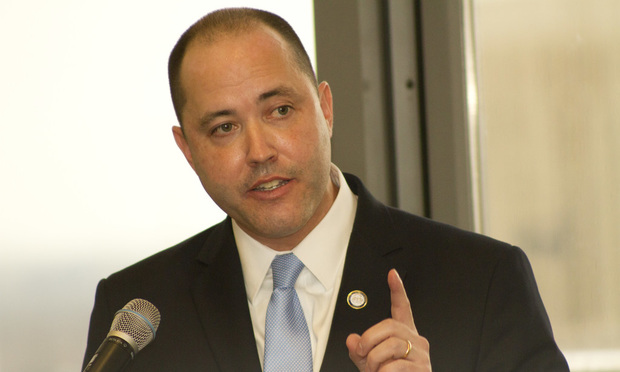5 Plead Guilty in $3.7M WIC Food Voucher Scheme
“The tax dollars used to support this program are intended to help vulnerable women, infants and children in our state, and not to line the pockets of others," AG Chris Carr said. "This should send a message."
February 13, 2019 at 04:56 PM
5 minute read
 Chris Carr, Georgia attorney general (Photo: John Disney/ALM)
Chris Carr, Georgia attorney general (Photo: John Disney/ALM)
Five people have now pleaded guilty to racketeering for their role in a scheme that siphoned $3.7 million from the program that provides milk, cheese and basic subsistence to poor mothers and babies, Georgia Attorney General Chris Carr said Wednesday.
“I applaud the cooperative work of our prosecution division, the Georgia Bureau of Investigation and the United States Department of Agriculture in this case,” Carr said in a news release Wednesday. “The tax dollars used to support this program are intended to help vulnerable women, infants and children in our state, and not to line the pockets of others. This should send a message that we will always protect the most vulnerable in our state and ensure compliance with the programs we have instituted for their support.”
The indictment alleged the defendants engaged in a scheme to defraud the WIC program through the unauthorized use and redemption of vouchers—which are intended to be used for food only at authorized stores. Some of the defendants were accused of paying cash for vouchers. Others were accused of stamping the vouchers with WIC vendor numbers they were not authorized to use, and depositing them into their bank accounts. At least one defendant owned a store that was authorized to participate in the WIC program, and the others allegedly funneled fraudulent vouchers there. The Georgia Department of Public Health paid for the vouchers under the false impression they were being redeemed by the vendors whose identification numbers were stamped on them. Carr said payments from the unauthorized redemption of these vouchers of more than $3.7 million dollars were made into bank accounts owned by three defendants.
Carr announced the following conclusions to cases in Fayette County Superior Court.
Lashana Glasper entered a plea of guilty and was sentenced on Aug. 2 by Judge W. Fletcher Sams to 15 years to serve two and required to pay restitution of $237,951.
Court records show Glasper was represented by defense attorneys Meg Strickler of Conaway & Strickler and Curtis Hubbard of Franklin & Hubbard. Strickler could not be reached immediately.
Anthony T. Jones entered a plea of guilty and was sentenced under the First Offender Act on Jan. 24 by Senior Judge John C. Carbo III to three years of probation and required to pay restitution of $500,000.
Chrissy Davidson Jones entered a plea of guilty and was sentenced under the First Offender Act on Jan. 24, also by Carbo, to 15 years to serve four and required to pay restitution of $583,859. Two years of the four years in prison will be suspended if she pays all of the restitution by Aug. 1.
Both the Joneses were represented by Kristen Wright Novay of Garland, Samuel & Loeb.
Novay said Thursday that her clients had not paid cash for vouchers, but had only used another store's WIC stamp because they lost their's after being unable to following changing rules. “These were not dangerous people,” she said. “I think it's a total loss for the community.” She said her client had long since closed her store, was raising a family and volunteering in her children's school.
“These people are wonderful human beings,” Novay said. “It was a devastating case.”
Melzie Larvell Pullin entered a plea of guilty and was sentenced on Jan. 24, also by Carbo, to 15 years to serve two and required to pay restitution of $401,565.
Pullin was represented by David Todd Wooten. He said she also was sentenced under the First Offender Act.
Wooten said Pullin didn't know the other defendants. “They bootstrapped a conspiracy theory together,” he said. “In general, that amount of restitution is never going to be recovered, because people don't have that kind of money.”
Tiasha Hendricks entered a guilty plea and was sentenced on Feb. 11, also by Carbo, to 15 years to serve one year, plus restitution of $500,000.
Hendricks was represented by Manubir Arora of Arora & LaScala.
“She's a nice lady. I felt she had a valid defense,” Arora said. He said Hendricks owned a store that provided goods in exchange for vouchers. But she got into trouble because she used another store's WIC stamp. She had lost her stamp after an inspection found she didn't have enough merchandise on hand. That was eight years ago.
“It was a frustrating case, because it took so long, a lot of evidence wasn't available,” Arora said.
Senior Assistant Attorney General Greg Lohmeier and Assistant Attorney General Blair McGowan prosecuted the case for Carr's office. The case was investigated by Deborah Loving and Robert Balsam of the Georgia Bureau of Investigation with the U.S. Department of Agriculture, Office of Inspector General-Investigations, Carr said.
This content has been archived. It is available through our partners, LexisNexis® and Bloomberg Law.
To view this content, please continue to their sites.
Not a Lexis Subscriber?
Subscribe Now
Not a Bloomberg Law Subscriber?
Subscribe Now
NOT FOR REPRINT
© 2025 ALM Global, LLC, All Rights Reserved. Request academic re-use from www.copyright.com. All other uses, submit a request to [email protected]. For more information visit Asset & Logo Licensing.
You Might Like
View All

On The Move: Ex-Partner Returns to Lead Nelson Mullins Corporate Group, Burr & Forman Hires University GC as COO
5 minute read
Law Firm Sued for Telemarketing Calls to Customers on Do Not Call Registry

Evidence Explained: Prevailing Attorney Outlines Successful Defense in Inmate Death Case
Trending Stories
Who Got The Work
J. Brugh Lower of Gibbons has entered an appearance for industrial equipment supplier Devco Corporation in a pending trademark infringement lawsuit. The suit, accusing the defendant of selling knock-off Graco products, was filed Dec. 18 in New Jersey District Court by Rivkin Radler on behalf of Graco Inc. and Graco Minnesota. The case, assigned to U.S. District Judge Zahid N. Quraishi, is 3:24-cv-11294, Graco Inc. et al v. Devco Corporation.
Who Got The Work
Rebecca Maller-Stein and Kent A. Yalowitz of Arnold & Porter Kaye Scholer have entered their appearances for Hanaco Venture Capital and its executives, Lior Prosor and David Frankel, in a pending securities lawsuit. The action, filed on Dec. 24 in New York Southern District Court by Zell, Aron & Co. on behalf of Goldeneye Advisors, accuses the defendants of negligently and fraudulently managing the plaintiff's $1 million investment. The case, assigned to U.S. District Judge Vernon S. Broderick, is 1:24-cv-09918, Goldeneye Advisors, LLC v. Hanaco Venture Capital, Ltd. et al.
Who Got The Work
Attorneys from A&O Shearman has stepped in as defense counsel for Toronto-Dominion Bank and other defendants in a pending securities class action. The suit, filed Dec. 11 in New York Southern District Court by Bleichmar Fonti & Auld, accuses the defendants of concealing the bank's 'pervasive' deficiencies in regards to its compliance with the Bank Secrecy Act and the quality of its anti-money laundering controls. The case, assigned to U.S. District Judge Arun Subramanian, is 1:24-cv-09445, Gonzalez v. The Toronto-Dominion Bank et al.
Who Got The Work
Crown Castle International, a Pennsylvania company providing shared communications infrastructure, has turned to Luke D. Wolf of Gordon Rees Scully Mansukhani to fend off a pending breach-of-contract lawsuit. The court action, filed Nov. 25 in Michigan Eastern District Court by Hooper Hathaway PC on behalf of The Town Residences LLC, accuses Crown Castle of failing to transfer approximately $30,000 in utility payments from T-Mobile in breach of a roof-top lease and assignment agreement. The case, assigned to U.S. District Judge Susan K. Declercq, is 2:24-cv-13131, The Town Residences LLC v. T-Mobile US, Inc. et al.
Who Got The Work
Wilfred P. Coronato and Daniel M. Schwartz of McCarter & English have stepped in as defense counsel to Electrolux Home Products Inc. in a pending product liability lawsuit. The court action, filed Nov. 26 in New York Eastern District Court by Poulos Lopiccolo PC and Nagel Rice LLP on behalf of David Stern, alleges that the defendant's refrigerators’ drawers and shelving repeatedly break and fall apart within months after purchase. The case, assigned to U.S. District Judge Joan M. Azrack, is 2:24-cv-08204, Stern v. Electrolux Home Products, Inc.
Featured Firms
Law Offices of Gary Martin Hays & Associates, P.C.
(470) 294-1674
Law Offices of Mark E. Salomone
(857) 444-6468
Smith & Hassler
(713) 739-1250






